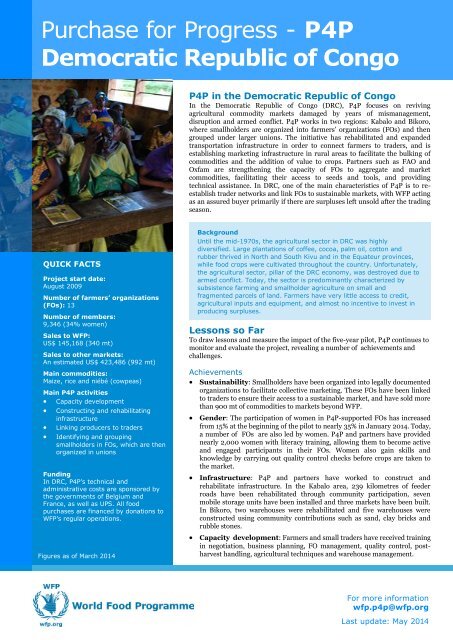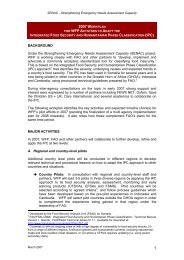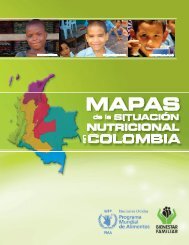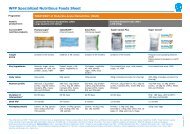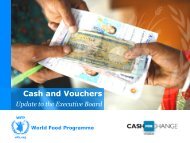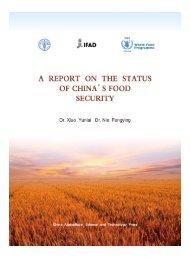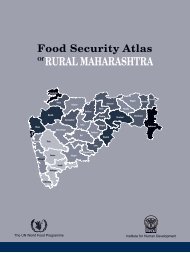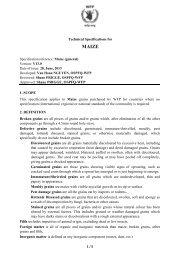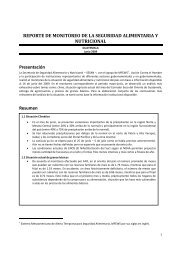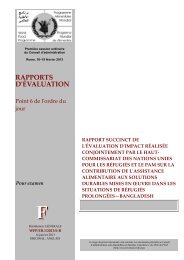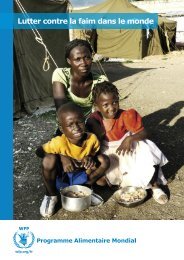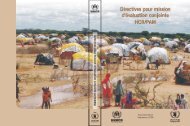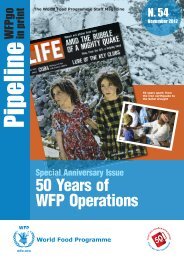DRC Purchase for Progress - WFP Remote Access Secure Services
DRC Purchase for Progress - WFP Remote Access Secure Services
DRC Purchase for Progress - WFP Remote Access Secure Services
Create successful ePaper yourself
Turn your PDF publications into a flip-book with our unique Google optimized e-Paper software.
<strong>Purchase</strong> <strong>for</strong> <strong>Progress</strong> - P4PDemocratic Republic of CongoP4P in the Democratic Republic of CongoIn the Democratic Republic of Congo (<strong>DRC</strong>), P4P focuses on revivingagricultural commodity markets damaged by years of mismanagement,disruption and armed conflict. P4P works in two regions: Kabalo and Bikoro,where smallholders are organized into farmers’ organizations (FOs) and thengrouped under larger unions. The initiative has rehabilitated and expandedtransportation infrastructure in order to connect farmers to traders, and isestablishing marketing infrastructure in rural areas to facilitate the bulking ofcommodities and the addition of value to crops. Partners such as FAO andOxfam are strengthening the capacity of FOs to aggregate and marketcommodities, facilitating their access to seeds and tools, and providingtechnical assistance. In <strong>DRC</strong>, one of the main characteristics of P4P is to reestablishtrader networks and link FOs to sustainable markets, with <strong>WFP</strong> actingas an assured buyer primarily if there are surpluses left unsold after the tradingseason.QUICK FACTSProject start date:August 2009Number of farmers’ organizations(FOs): 13Number of members:9,346 (34% women)Sales to <strong>WFP</strong>:US$ 145,168 (340 mt)Sales to other markets:An estimated US$ 423,486 (992 mt)Main commodities:Maize, rice and niébé (cowpeas)Main P4P activities Capacity development Constructing and rehabilitatinginfrastructure Linking producers to traders Identifying and groupingsmallholders in FOs, which are thenorganized in unionsFundingIn <strong>DRC</strong>, P4P’s technical andadministrative costs are sponsored bythe governments of Belgium andFrance, as well as UPS. All foodpurchases are financed by donations to<strong>WFP</strong>’s regular operations.Figures as of March 2014BackgroundUntil the mid-1970s, the agricultural sector in <strong>DRC</strong> was highlydiversified. Large plantations of coffee, cocoa, palm oil, cotton andrubber thrived in North and South Kivu and in the Equateur provinces,while food crops were cultivated throughout the country. Un<strong>for</strong>tunately,the agricultural sector, pillar of the <strong>DRC</strong> economy, was destroyed due toarmed conflict. Today, the sector is predominantly characterized bysubsistence farming and smallholder agriculture on small andfragmented parcels of land. Farmers have very little access to credit,agricultural inputs and equipment, and almost no incentive to invest inproducing surpluses.Lessons so FarTo draw lessons and measure the impact of the five-year pilot, P4P continues tomonitor and evaluate the project, revealing a number of achievements andchallenges.Achievements Sustainability: Smallholders have been organized into legally documentedorganizations to facilitate collective marketing. These FOs have been linkedto traders to ensure their access to a sustainable market, and have sold morethan 900 mt of commodities to markets beyond <strong>WFP</strong>. Gender: The participation of women in P4P-supported FOs has increasedfrom 15% at the beginning of the pilot to nearly 35% in January 2014. Today,a number of FOs are also led by women. P4P and partners have providednearly 2,000 women with literacy training, allowing them to become activeand engaged participants in their FOs. Women also gain skills andknowledge by carrying out quality control checks be<strong>for</strong>e crops are taken tothe market. Infrastructure: P4P and partners have worked to construct andrehabilitate infrastructure. In the Kabalo area, 239 kilometres of feederroads have been rehabilitated through community participation, sevenmobile storage units have been installed and three markets have been built.In Bikoro, two warehouses were rehabilitated and five warehouses wereconstructed using community contributions such as sand, clay bricks andrubble stones. Capacity development: Farmers and small traders have received trainingin negotiation, business planning, FO management, quality control, postharvesthandling, agricultural techniques and warehouse management.For more in<strong>for</strong>mationwfp.p4p@wfp.orgLast update: May 2014
P4P - <strong>DRC</strong> Equipment: P4P has provided FOs with equipment including trolleys,bicycles and pick-up trucks, as well as warehouse equipment such as sewingmachines, scales, sprayers, pallets, shellers, huskers, and mills. FOs havealso been equipped with “Blue Box” quality control field testing kits, andtrained on how to use them. Sharing market in<strong>for</strong>mation: A market in<strong>for</strong>mation system has beenestablished to help traders and farmers access and share in<strong>for</strong>mation aboutmarket prices and the availability of commodities. Ripple effect: Some smallholders not directly supported by P4P now takepart in collective marketing. In part, this is because community awarenessraisingcampaigns have exposed them to the positive impact that collectivemarketing can have on the prices they receive <strong>for</strong> their produce.Moseka is currently undergoingliteracy training provided by P4Ppartners BUCODED and Oxfam. She ismarried with children. She says thatalthough she wanted to go to school,she was unable to because her fatherwas only willing to pay school fees <strong>for</strong>her brother. Instead, she per<strong>for</strong>medhousehold tasks in preparation <strong>for</strong>marriage.“P4P has opened my eyes, movingme from the darkness into thelight. I can now read and writeand can also learn newagricultural techniques. I hopethat more funds will be given toP4P in order to blossom out andempower more women.”Challenges Funding: In <strong>DRC</strong>, funding <strong>for</strong> P4P is unpredictable, making it difficult tocreate long-term plans.Climate variation: Flooding and unusual droughts caused extensive lossof crops during 2013 in Kabalo and 2012 in Bikoro. Lengthy procurement process: While recognizing the benefits ofcollective marketing, many farmers still sell individually to acquireimmediate cash <strong>for</strong> their families’ primary needs, such as healthcare andschool fees. This is partly due to the lengthy process of <strong>WFP</strong> procurement.PartnershipsIn <strong>DRC</strong>, P4P partners with organizations including BUCODED, FAO, IDR,Oxfam GB, SNV, UNFPA and UNOPs. These organizations developsmallholders’ capacity in production and marketing, enabling them to moreeffectively aggregate and market their yields. BUCODED and Oxfam carry outthe literacy programme, and are also responsible <strong>for</strong> identifying and organizingsmallholders into FOs, which are then grouped into unions. Oxfam and UNOPscarry out infrastructure rehabilitation, and a community-driven roadmaintenance programme is facilitated by IDR. SNV set up the marketin<strong>for</strong>mation system and has facilitated the creation of links between producersand traders.KEY PARTNERS Advising Bureau <strong>for</strong> SustainableDevelopment (BUCODED) Food and Agriculture Organizationof the United Nations (FAO) Netherlands DevelopmentOrganization (SNV) Oxfam GB Rural Development Inspectorate(IDR) United Nations Population Fund(UNFPA) United Nations Office <strong>for</strong> Project<strong>Services</strong> (UNOPS)Read more about<strong>WFP</strong> in <strong>DRC</strong>P4P helps build a newgeneration of farmersIncome increase enablesbusiness diversification<strong>WFP</strong> ACTIVITIES IN <strong>DRC</strong>In <strong>DRC</strong>, <strong>WFP</strong> targets populations made vulnerable and food insecure byarmed conflict, lack of basic social services, low agricultural productivity andchronic poverty. <strong>WFP</strong> has implemented two emergency operations: one toaddress the needs of displaced populations, and another to assistpopulations in conflict and food insecure areas with high malnutrition rates.Relief activities include general food assistance to internally displacedpersons (IDP) and their host families, and the treatment and prevention ofmoderate to acute malnutrition. Recovery activities include school feeding,food <strong>for</strong> assets and support to HIV/AIDS and Tuberculosis (TB) patients.Through the PRRO, <strong>WFP</strong> has enhanced the government's capacity to carryout food security and nutrition assessments. Commodities purchasedthrough P4P modalities are used in the food <strong>for</strong> work and school feedingprogrammes.For more in<strong>for</strong>mationwfp.p4p@wfp.orgLast update: May 2014


